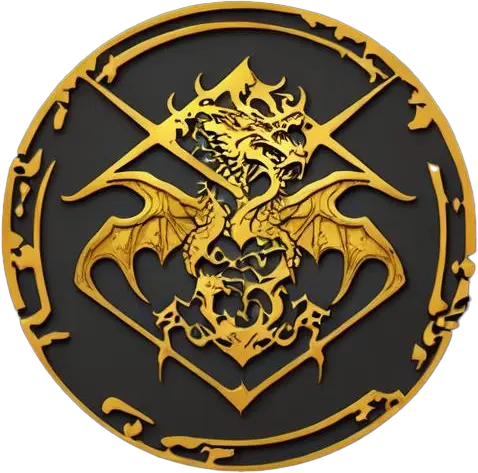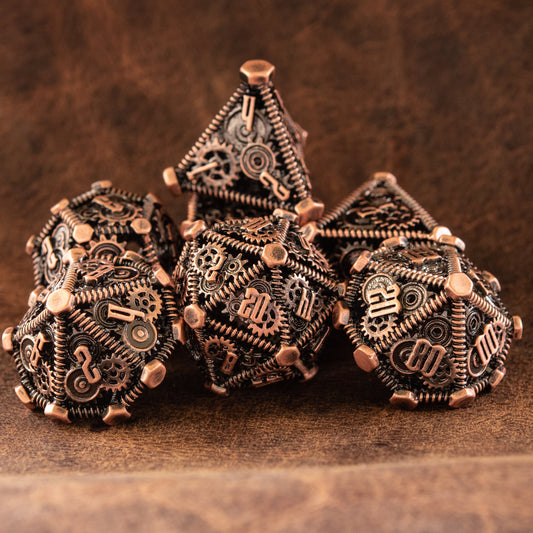Exploring RPG Dice Systems: A Comprehensive Guide
Introduction
When it comes to tabletop roleplaying games (RPGs), understanding different RPG dice systems is crucial for both players and game masters. Dice determine the outcomes of actions, influence the narrative, and add an element of unpredictability that keeps the game exciting. Whether you're a seasoned player or a newcomer to the world of RPGs, this guide will help you navigate the diverse landscape of RPG dice systems, enhancing your gameplay experience.
Common Types of Dice
Standard Dice Set
In most RPGs, especially those like Dungeons & Dragons (D&D), a standard set of seven polyhedral dice is used. This set includes:
- d4 (tetrahedron): A four-sided die, often used for small damage rolls or minor effects.
- d6 (cube): The classic six-sided die, used for various purposes including weapon damage and skill checks.
- d8 (octahedron): An eight-sided die, commonly used for weapon damage and some spell effects.
- d10 (pentagonal trapezohedron): A ten-sided die, used for percentile rolls (when paired with another d10) and specific damage types.
- d12 (dodecahedron): A twelve-sided die, often used for larger weapon damage rolls.
- d20 (icosahedron): The quintessential twenty-sided die, central to the d20 system used in D&D for attack rolls, saving throws, and skill checks.
- d100 (percentile dice): Typically represented by two ten-sided dice, one indicating tens and the other units, used for generating numbers between 1 and 100.
Specialty Dice
Beyond the standard set, there are specialty dice designed for specific games or mechanics:
- Fudge Dice (or Fate Dice): Six-sided dice marked with plus, minus, and blank faces, used in the Fudge and Fate systems to determine outcomes on a scale from -4 to +4.
- Custom Symbol Dice: Found in games like Fantasy Flight's Star Wars RPG, these dice feature symbols instead of numbers to represent successes, failures, and other effects.
- Exploding Dice: Used in games like Savage Worlds, these dice can be rolled again if they land on their maximum value, adding the new roll to the initial result for potentially high outcomes.
Dice Notation
Basic Notation
Dice notation is a shorthand method to describe the dice rolls required in gameplay. The most common format is:
- XdY: Where X is the number of dice to roll, and Y is the number of sides on each die. For example, 3d6 means rolling three six-sided dice.
Modifiers can be added to the roll:
- XdY + Z: Adds a flat number (Z) to the total roll. For example, 1d20 + 5 means rolling one twenty-sided die and adding five to the result.
Advanced Notation
Some systems use more complex notations to handle specific mechanics:
- XdY - L: Roll X number of Y-sided dice and subtract the lowest result. For example, 4d6 - L means rolling four six-sided dice and subtracting the lowest roll.
- XdYkZ: Roll X number of Y-sided dice and keep the highest Z results. For example, 5d10k3 means rolling five ten-sided dice and keeping the highest three results.
Dice-Rolling Mechanics
Single Die Rolls
In systems like Dungeons & Dragons, single die rolls are common for resolving actions. For instance, a player might roll a d20 to determine if an attack hits, adding any relevant modifiers to the result. If the total meets or exceeds the target number (Difficulty Class), the action succeeds.
Multiple Dice Rolls
Rolling multiple dice and adding the results is another common mechanic. This approach can smooth out the probability curve, making extreme results less likely and average results more common. For example:
- Advantage/Disadvantage: In D&D 5th Edition, rolling two d20s and taking the higher (advantage) or lower (disadvantage) result.
- Dice Pools: Used in games like Shadowrun, where players roll a number of dice equal to their skill level, counting the number of dice that meet or exceed a target number to determine success.
History of RPG Dice
Ancient Origins
Dice have a rich history dating back to ancient civilizations. Games like Senet in Egypt and the Royal Game of Ur in Mesopotamia used early forms of dice. These ancient dice were often made from materials like bone, wood, or stone, and were used to introduce elements of chance into games.
Evolution in Tabletop RPGs
The use of dice in tabletop RPGs began with the advent of Dungeons & Dragons in the 1970s. The creators, Gary Gygax and Dave Arneson, incorporated polyhedral dice to introduce randomness and excitement into gameplay. Over time, dice have become an iconic element of RPGs, with various systems developing their unique mechanics and dice requirements.
Understanding RPG dice systems not only enhances your gameplay but also deepens your appreciation for the intricate mechanics that drive these beloved games. Whether you're rolling a d20 in D&D or a handful of d6s in Shadowrun, the dice are at the heart of the adventure, determining the fate of characters and the unfolding of epic stories.
Exploring RPG Dice Systems: A Comprehensive Guide
Choosing the Right System
When it comes to selecting the ideal RPG dice system for your game, both game masters and players have specific considerations to keep in mind. The choice of dice system can significantly impact the flow and enjoyment of the game.
Game Master Considerations
For game masters, the primary factors to consider include:
- Complexity: Some dice systems are more complex than others. For example, the d20 system used in Dungeons & Dragons is relatively straightforward, while dice pool systems like those in Shadowrun can be more intricate.
- Game Theme: The thematic elements of the game can influence the choice of dice. For instance, a game set in a gritty, realistic world might benefit from a percentile system like Call of Cthulhu, which can simulate the harshness of reality.
- Player Experience: Consider the experience level of your players. Newcomers might find simpler systems more accessible, whereas seasoned players might enjoy the depth of more complex mechanics.
- Narrative Flow: The dice system should complement the narrative style of the game. Systems with fewer rolls can keep the story moving smoothly, while those with more rolls can add tension and excitement.
Player Preferences
Different players have different preferences when it comes to dice systems:
- Simplicity vs. Complexity: Some players prefer the simplicity of single die rolls, while others enjoy the strategic depth of rolling multiple dice.
- Tactile Experience: Rolling physical dice can be a satisfying experience for many players. The feel of a handful of dice or the sound of them hitting the table can enhance immersion.
- Probability and Control: Players who enjoy calculating probabilities might prefer systems with more dice rolls, as they offer a greater sense of control over outcomes.
- Thematic Immersion: Custom dice with symbols or unique designs can enhance the thematic elements of a game, making it more immersive for players.
Comparing Dice Systems
Understanding the differences between various dice systems can help you choose the one that best suits your game.
Ease of Use
Different dice systems vary in their complexity and ease of use:
- d20 System: Known for its simplicity, the d20 system is easy to learn and quick to use. It involves rolling a single 20-sided die and adding modifiers, making it accessible for all players.
- Percentile Systems: These systems, like those used in Call of Cthulhu, involve rolling two ten-sided dice to generate a number between 1 and 100. They are straightforward but can offer a more granular level of detail.
- Dice Pool Systems: Found in games like Shadowrun, these systems involve rolling multiple dice and counting successes. They can be more complex but allow for greater variability in outcomes.
Probability Curves
The probability curves of different dice systems can greatly impact gameplay:
- Flat Distribution: Systems like the d20 system have a flat probability distribution, meaning each number on the die has an equal chance of being rolled. This can lead to more unpredictable outcomes.
- Bell Curve Distribution: Rolling multiple dice, as in dice pool systems, results in a bell curve distribution. This makes average results more common and extreme results less likely, providing a more predictable outcome.
- Percentile Systems: These systems offer a linear probability distribution, allowing for precise calculations of success rates. They are ideal for games that require detailed skill checks and realistic outcomes.
Popular Dice Systems
Several dice systems are widely used in RPGs, each with its own strengths and weaknesses.
d20 System
The d20 system, used in Dungeons & Dragons, is one of the most popular dice systems:
- Pros: Simple and quick to use, with a wide range of modifiers and options for customization.
- Cons: The flat probability distribution can lead to highly variable outcomes, which may not suit all game styles.
Percentile Systems
Percentile systems, like those in Call of Cthulhu, offer precise control over probabilities:
- Pros: Highly detailed and realistic, with clear success and failure thresholds.
- Cons: Can be less intuitive for new players and may require more calculation.
Dice Pool Systems
Games like Shadowrun and Vampire: The Masquerade use dice pool systems:
- Pros: Allow for a wide range of outcomes and can add depth to skill checks and combat.
- Cons: Can be complex and time-consuming, especially with large dice pools.
Enhancing Gameplay with Dice
Beyond the basic mechanics, there are several ways to enhance gameplay using dice.
Custom Dice
Custom dice can add a unique flavor to your game:
- Thematic Elements: Dice with custom symbols or designs can reinforce the theme of the game, making it more immersive.
- Special Mechanics: Custom dice can introduce new mechanics, such as special abilities or effects, that standard dice cannot.
Digital Dice Rollers
With the rise of digital tools, many players and game masters are turning to digital dice rollers:
- Pros: Convenient and quick, with no need to carry physical dice. They can also handle complex calculations and large dice pools with ease.
- Cons: Lack the tactile experience of rolling physical dice, which some players find less satisfying.
Conclusion
Summary
Understanding the various RPG dice systems is essential for both players and game masters. From the simplicity of the d20 system to the complexity of dice pool systems, each has its own unique advantages and challenges. By considering factors such as ease of use, probability curves, and thematic elements, you can choose the system that best suits your game.
Call to Action
We encourage you to explore different dice systems and find the one that works best for you. Whether you're a game master looking to enhance your campaign or a player seeking a deeper understanding of game mechanics, experimenting with different systems can lead to a richer and more enjoyable RPG experience. Dive into the world of RPG dice systems and discover the endless possibilities they offer for your tabletop adventures!
By following these guidelines and exploring the diverse landscape of RPG dice systems, you'll be well-equipped to enhance your gameplay and create unforgettable stories. Happy rolling!







